新概念英语第二册第30课-Football or polo-
新概念英语第二册Lesson30Footballorpolo_导学案

新概念英语第二册Lesson 30Football or polo? 足球还是水球?The Wayle is a small river that cuts across the park near my home. I like sitting by the Wayle on fine afternoons. It was warm last Sunday, so I went and sat on the river bank as usual. Some children were playing games on the bank and there were some people rowing on the river. Suddenly, one of the children kicked a ball very hard and it went towards a passing boat. Some people on the bank called out to the man in the boat, but he did not hear them. The ball struck him so hard that he nearly fell into the water. I turned to look at the children, but there werent any in sight: they had all run away! The man laughed when he realized what had【课文翻译】The Wayle is a small river that cuts across the park near my home.威尔河是横穿过我家附近公园的一条小河。
I like sitting by the Wayle on fine afternoons.我喜欢在天气晴朗的下午到河边坐坐。
新概念英语第二册Lesson 30

Lesson 30 Football or polo? 足球还是水球?一.单词、短语1.polo n.水球Polo衫:原本称作网球衫,后来由于一个名为polo的人设计了新型的衬衫,后长、前短,且侧边有一小截开口的下摆大受欢迎,由此命名为polo衫。
2.cut v.穿过cut across the park near my home延伸:Cut v.切开;削减;cut sb sth=cut sth for sb 为某人切某物。
如:Cut me some bread,please.=Cut some bread for me.cut sth into sth 把某物切成某物,如:He cut the meat into small pieces.注:若指分为两半,可说cut sth into halves或cut sth in half.cut down 砍倒;削减They cut down the big tree. You should cut down the expenses in every way.cut across 抄近路;走捷径3.row v.划(船)延伸:row n.行,排;吵闹;v.划船:使....成排;争吵,吵闹oar n.桨;v.划(行)见课后习题4.kick v.踢问题:踢足球?5.towards prep.朝,向延伸:toward prep.1. 向,朝They drove toward the beach. 他们驾车朝海滩开去。
2. 接近,将近Toward dawn we found ourselves in a large valley.快天亮时,我们走进了一个大的山谷。
3. 对于;关于The overseas teacher said her Chinese colleagues were friendly toward her.那位外籍教师说她的中国同事对她很友善。
新概念第二册Lesson 30 Football or polo
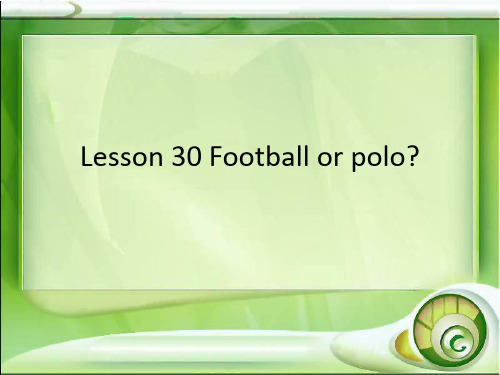
Rugby(American football)
• 橄榄球 橄榄球,球类运动的一种,盛行于英国、 美国、澳大利亚、日本等国家。 橄榄球可以用手碰球,进攻方式多样。
Which one do you think is more dangerous?
• Soccer? Football? • What do you think is Worealize 和know都有了解的意思,但是realize更 加强调意识到这一个过程,而know更强调 对结果的陈述。 用realize或know填空
I didn’t _______ it was her until she greeted me. I didn’t ________ her until you introduce her to me.
water polo
• 水球是一种在水中进行的集体球类运动, 是一项结合游泳,手球,篮球,橄榄球的 运动。比赛的目的类似于足球,以射入对 方球门次数多的一方为胜。水球运动员在 比赛时以游泳的方式运动,除守门员外两 手同时握球是一种犯规行为。
What are they doing?
Realize:了解,意识到 The man laughed when he realized what had happened.
词组
go towards… call out to sb. fall into … run away What’s their meaning and how do you use them?
• 定语从句部分见文件夹中定语从句的参考 课件
+ v.+ing 的动词你知道多少?
• i.e: like doing sth. hate doing sth. love doing sth.
Lesson30Footballorpolo_(课件)新概念英语第二册(1)
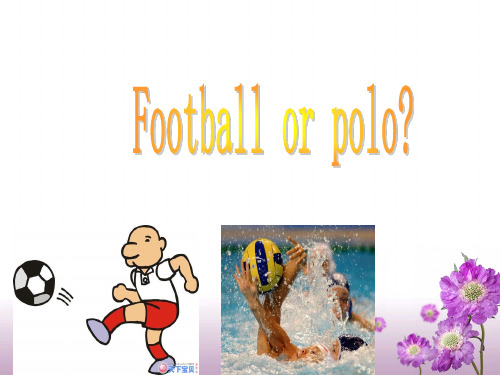
• 在天气晴朗的下午 on fine afternoons • 在威尔河边 by the Wayle • 我喜欢在天气晴朗的下午到河边坐坐。
• I like sitting by the Wayle on fine afternoons.
• 和往常一样as usual 河边river bank
• 上星期日天气很暖和。于是我和往常一样,又去 河边坐着。
• out of sight 在视线之外 • in sight 在视线之内
眼不见心不烦 out of sighe river bank [bANk] n.岸; 堤 • bank 银行
• towards prep. 朝, 向
• He walked towards me.
2. What were some children doing?
3. What happened to the man in the boat?
• 威尔 The wayle 横穿 cut across • 威尔河是横穿过我家附近公园的一条小河。
• The wayle is a small river that cuts across the park near my home.
Check
• Words and Phrases of Lesson 28,29 • Reciting of one lesson.
polo [‘pəuləu] n. 水球 Wayle [weil ] n. 威尔(河名) cut [kʌt] (cut, cut)v. 穿过 row [rəu] v. 划(船) kick [kik] v. 踢 towards [tə'wɔ:dz] prep. 朝,向 nearly ['niəli] adv. 几乎 sight [sait] n. 眼界,视域
(完整版)新概念二册第30课Lesson30
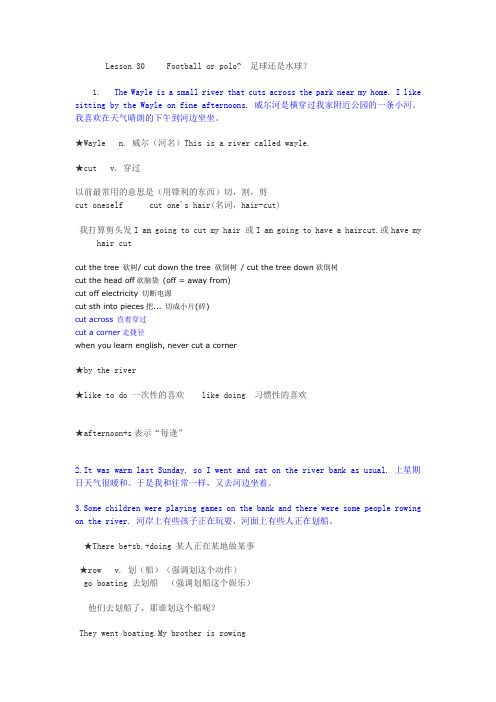
Lesson 30 Football or polo? 足球还是水球?1. The Wayle is a small river that cuts across the park near my home. I like sitting by the Wayle on fine afternoons. 威尔河是横穿过我家附近公园的一条小河。
我喜欢在天气晴朗的下午到河边坐坐。
★Wayle n. 威尔(河名)This is a river called wayle.★cut v. 穿过以前最常用的意思是(用锋利的东西)切,割,剪cut oneself cut one's hair(名词,hair-cut)我打算剪头发I am going to cut my hair 或I am going to have a haircut.或have my hair cutcut the tree 砍树/ cut down the tree 砍倒树/ cut the tree down砍倒树cut the head off砍脑袋(off = away from)cut off electricity 切断电源cut sth into pieces把... 切成小片(碎)cut across 直着穿过cut a corner走捷径when you learn english, never cut a corner★by the river★like to do 一次性的喜欢 like doing 习惯性的喜欢★afternoon+s表示“每逢”2.It was warm last Sunday, so I went and sat on the river bank as usual. 上星期日天气很暖和。
于是我和往常一样,又去河边坐着。
3.Some children were playing games on the bank and there were some people rowing on the river. 河岸上有些孩子正在玩耍,河面上有些人正在划船。
新概念二册课件Lesson30FootballorPolo
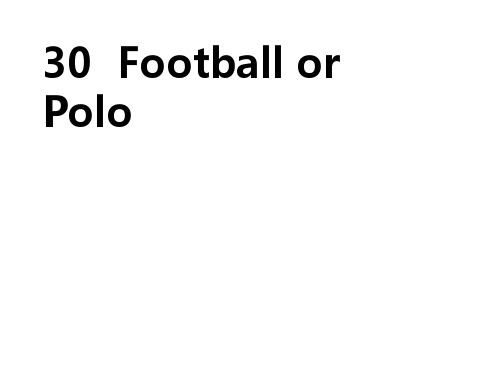
exciting game.
B. /, an
C. a, an
D. /, the
4. We all knoBw
moon moves around
earth,
A.anda,
an,
earth an, a
moves
around B.
the,
XXX. the, the,
the
C. a, the, the, a
breakfast.
In
spring, I can fly kites.
In
summer, I go swimming
in _____Yellow River.
In
autumn, I can climb ______Everest.
In
winter, I make ____ snowman.
kick v.
•kick sth. •踢球 •kick a ball
New words and expression
kick v.
•kick sth. •踢门 •kick the door
New words and expression
nearly adv.
•almost, but not quite or not completely •几乎
Ⅰ. Listen to the text, then answer the questions below.
(1) Did the writer sit by the river last XXXday or not ? (2) Who kicked a ball hard ? (3) Did the ball hit the man or not ?
(完整版)新概念二册第30课Lesson30

Lesson 30 Football or polo? 足球还是水球?1. The Wayle is a small river that cuts across the park near my home. I like sitting by the Wayle on fine afternoons. 威尔河是横穿过我家附近公园的一条小河。
我喜欢在天气晴朗的下午到河边坐坐。
★Wayle n. 威尔(河名)This is a river called wayle.★cut v. 穿过以前最常用的意思是(用锋利的东西)切,割,剪cut oneself cut one's hair(名词,hair-cut)我打算剪头发I am going to cut my hair 或I am going to have a haircut.或have my hair cutcut the tree 砍树/ cut down the tree 砍倒树/ cut the tree down砍倒树cut the head off砍脑袋(off = away from)cut off electricity 切断电源cut sth into pieces把... 切成小片(碎)cut across 直着穿过cut a corner走捷径when you learn english, never cut a corner★by the river★like to do 一次性的喜欢 like doing 习惯性的喜欢★afternoon+s表示“每逢”2.It was warm last Sunday, so I went and sat on the river bank as usual. 上星期日天气很暖和。
于是我和往常一样,又去河边坐着。
3.Some children were playing games on the bank and there were some people rowing on the river. 河岸上有些孩子正在玩耍,河面上有些人正在划船。
新概念英语第二册Lesson30课件

• It was warm last Sunday, so I went and sat on the river bank as usual. • bank 河岸;银行 Agriculture Bank of China中国农业银行 Industial and Commercial Bank of China 中国工商银行 Why is the river rich? Because it has two banks.
sight n.眼界,视线;风景
Love at first sight.一见钟情。 We have toured the sights of Paris.
1. catch sight of…
看见……
catch sight of the bird
=see the bird
看见那只鸟
2. out of sight
adv. hardly 几乎不
• hard adj. 辛苦的,努力的,坚硬的,苛刻的
• 1.The ground is as hard as stone after the drought. 长期干旱之后土地硬得就像石头一样. • 2.Don't be too hard on her, she's very young. 别对她太严了,她还小呢. • 3. It is a hard work. 这是个艰苦的工作。 • 4. adj.难做的; 难懂的; 难答的; 困难的 It's hard for him to understand the meaning. 对他而言,理解这个意思是很难的。
如果名词前由表示量的many, much, few, little等词所修饰的 话,不用such而用so 。
新概念二-第30课课件

text
Listen and fill in the blanks:
The Wayle is a small river that___________the park near my home. I like sitting___________ the Wayle ___________ . It was warm last Sunday, so Íwent and sat on the river bank___________ . Some children were playing games___________and there were some people___________ on the river.Suddenly, one of the children___________ a ball very hard and it went___________a passing boat. Some people on the bank ___________ the man in the boat, but he did not hear them.The ball___________him ___________ he nearly___________the water.I turned to___________the children, but there weren't any___________: they had all run away! The man laughed when he realized what had happened. He called out to the children and threw the bail back to ___________.
Lesson30Footballorpolo?(课件)新概念英语第二册
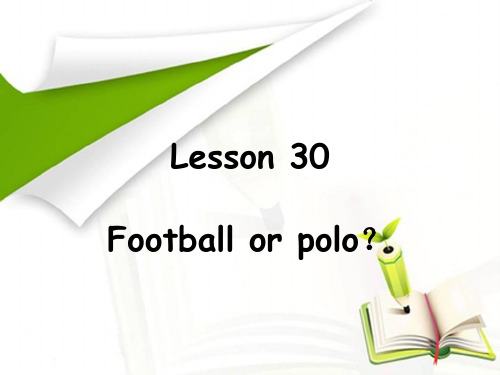
cut
• ② vt. 割破,划破 割伤手指 cut one’s finger 割伤自己 cut oneself
cut
• ③ vi. 横穿,穿越 The Wayle is a small river that cuts across the park near my home. cut across / through 直着穿过 这条路横穿过森林。
• Some people on the bank __6__ out to the man in the boat, but he did not hear them. The ball __7__ him so hard that he nearly fell into the water. I turned to look at the children, but there weren't __8__ in sight: they had all run away! The man laughed when he __9__ what had happened. He called out to the children and __10__ the ball back to the bank.
the park near my home.
• 我喜欢在天气晴朗的下午到河边坐坐.
• I like sitting by the Wayle on fine afternoons.
• 上星期日天气很暖和,于是我和往常一样, 又 去河边坐着.
• It was warm last Sunday, so I went and sat on the river bank as usual.
新概念第二册Lesson 30 Football or Polo讲义
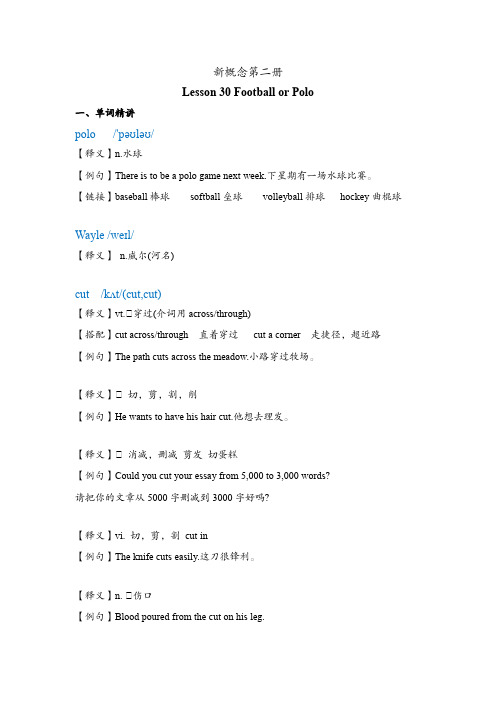
新概念第二册Lesson 30 Football or Polo一、单词精讲polo /'pəʊləʊ/【释义】n.水球【例句】There is to be a polo game next week.下星期有一场水球比赛。
【链接】baseball棒球softball垒球volleyball排球hockey曲棍球Wayle /weɪl/【释义】n.威尔(河名)cut /kʌt/(cut,cut)【释义】vt.①穿过(介词用across/through)【搭配】cut across/through 直着穿过cut a corner 走捷径,超近路【例句】The path cuts across the meadow.小路穿过牧场。
【释义】① 切,剪,割,削【例句】He wants to have his hair cut.他想去理发。
【释义】① 消减,删减剪发切蛋糕【例句】Could you cut your essay from 5,000 to 3,000 words?请把你的文章从5000字删减到3000字好吗?【释义】vi. 切,剪,割cut in【例句】The knife cuts easily.这刀很锋利。
【释义】n. ①伤口【例句】Blood poured from the cut on his leg.鲜血从他腿上的伤口涌出。
【释义】① 削减,减少【例句】They had to take a 20% cut in pay.他们不得不接受减薪20%。
【搭配】cut at 向……砍去cut in 超车;插嘴cut back(on)减少cut away 切除,剪掉cut out删掉;裁剪cut down 砍掉;削减cut through抄近路;开辟通道cut up 剁碎,切碎;割伤;使伤心a cut above比……高一筹,高明一些cut one's hair = have a hair cut 理发cut down the tree = cut the tree down 砍倒树cut the head off 砍脑袋(off = away from)cut off electricity 切断电源cut sth. into pieces 把……切成小片(碎)row /rəʊ/【释义】vi.划(船)【例句】What’s the name of that man who rowed across the Atlantic?划船穿过大西洋的那个男人叫什么名字?【释义】vt. 划(船)·.【例句】Can you row a boat?你会划船吗? (row强调动作)go boating 去划船(强调玩)【释义】n.(一)排,(一)行【例句】There is a row oftrees behind my house.我家屋后有一排树。
新概念第二册课文第30课:Footballorpolo

⽆忧考新概念频道为⼤家整理的新概念第⼆册课⽂第30课:Football or polo ,供⼤家参考。
更多阅读请查看本站频道。
The Wayle is a small river that cuts across the park near my home. I like sitting by the Wayle on fine afternoons. It was warm last Sunday, so I went and sat on the river bank as usual. Some children were playing games on the bank and there were some people rowing on the river. Suddenly, one of the children kicked a ball very hard and it went towards a passing boat. Some people on the bank called out to the man in the boat, but he did not hear them. The ball struck him so hard that he nearly fell into the water. I turned to look at the children, but there weren't any in sight: they had all run away! The man laughed when he realized what had happened. He called out to the children and threw the ball back to the bank.威尔河是横穿过我家附近公园的⼀条⼩河。
新概念英语2Lesson 30
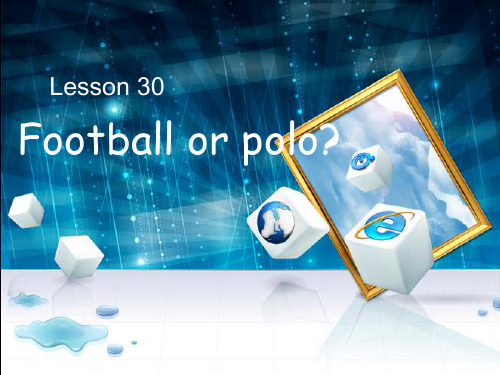
Football or polo?
【New words and expressions】
• ★polo n. 水球 • ★Wayle n. 威尔 (河名) • ★cut v. 穿过 • ★row v. 划(船) • ★kick v. 踢 • ★towards prep. 朝, 向 • ★nearly adv. 几乎 • ★sight n. 眼界,视 域
Grammar . 02
• The
• 在姓名、地名、国名(非复合词)前面通常不加 任何冠词。但在特指的海洋、河流、山脉以及部 分复合词形式的国名前,一定要用定冠词the;在 表示世界上独一无二的东西时,通常要加定冠词 the. • It can get very rough in the Mediterranean. 地中海中可能会非常不平静.
பைடு நூலகம்
• as usual 和往常一 样 • ★row v. 划(船) • ① vt.& vi. 划船 My brother is rowing. 划 船 (row强调动作, go boating 去划船强 调玩) • ② vt. 划船载运
【课文讲解】01. 02
• The Wayle is a small river that cuts across the park near my home. I like sitting by the Wayle on fine afternoons.
Listen To Carefully !!!
【课文讲解】03. 04
• It was warm last Sunday, so I went and sat on the river bank as usual. Some children were playing games on the bank and there were some people rowing on the river. 上星期日天气 很暖和. 于是我和往常一 样, 又去河边坐着. 河岸上 有些孩子正在玩耍, 河面 上有些人正在划船
新概念英语第二册第30课
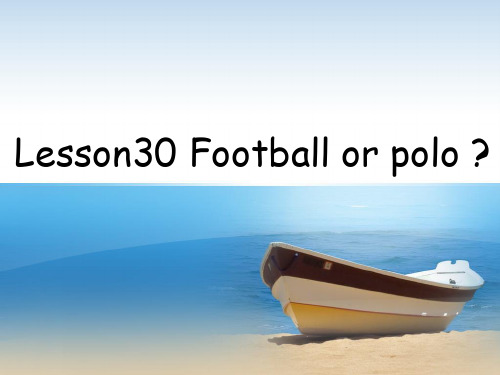
Key structures
some any Names
Key Structures
• some/any用法比较 • 二者都是表示不定量的代词,相当于“一些“ , 可修饰可数名词和不可数名词,some用于 肯定句,any用于疑问句,否定句或条件从句 。 some • 填词 any • Let’s get ___ fruit for the children. • Do you need ____ reference books? any • They haven’any t made ____ decisions. • If you find ___ new words in it, mark them out.
I
went sat turn to look at
children were playing games kicked ran away people called out to (on the bank) were rowing (on the river)
the man was rowing didn’t hear in the nearly fell into boat laughed called out to
I turned to look at the children, but there weren't any in sight: they had all run away! The man laughed when he realized what had happened.He called out to the children and threw the ball back to the bank. call out to sb对…大声喊叫 turn to: 转向,转身 turn to sb.: 向…求助
新概念第二册Lesson30 (共25张PPT)

• ★kick v. 踢 • 不要把球踢到河里。 • Don’t kick the ball into the river. • 我在足球比赛中提进一球。 • I kicked a goal in the football
match.
• ★nearly adv. 几乎 • 这份工作几乎要完成了
• The job is nearly finished.
• ★towards prep. in the direction of sb./sth. 朝, 向
• 他朝门口走去。 • He walked towards the door. • 同义词辨析:towards, to • towards只表示朝着目标移动,如: • 我们朝北京方向驶去 • We drove towards Beijing. • to含有到达之意,如我们开车去北京。 • We drove to Beijing.
• 许多大城市都建在河岸上。巴黎在塞纳河上,伦 敦在泰晤士河上,罗马在第伯尔河上。
• I know a__man who has been on climbing expeditions in many parts of _t_he_ world .He has climbed in t_h_e Alps, _t_h_e Himalayas, and __t_he_ Rocky Mountains.
• The ball struck him so hard that he nearly fell into the water.
• 复合句 so + adj./adv. that……如此……以至 于……引导结果状语从句
• 她是如此的生气以至于她不能说出话来 • She was so angry that she couldn’t speak. • 你说的如此的快我都不能跟上你。 • You speak so fast that I can’t follow you. • 扩展: such a/an +(adj.)+名词/名词短语
- 1、下载文档前请自行甄别文档内容的完整性,平台不提供额外的编辑、内容补充、找答案等附加服务。
- 2、"仅部分预览"的文档,不可在线预览部分如存在完整性等问题,可反馈申请退款(可完整预览的文档不适用该条件!)。
- 3、如文档侵犯您的权益,请联系客服反馈,我们会尽快为您处理(人工客服工作时间:9:00-18:30)。
新概念英语第二册第30课:Football or polo?Lesson 30 Football or polo?足球还是水球? First listen and then answer the question.听录音,然后回答以下问题。
What happened to the man in the boat?The Wayle is a small river that cuts across the park near my home.威尔河是横穿过我家附近公园的一条小河。
I like sitting by the Wayle on fine afternoons.我喜欢在天气晴朗的下午到河边坐坐。
It was warm last Sunday, so I went and sat on the river bank as usual.上星期日天气很暖和。
于是我和往常一样,又去河边坐着。
Some children were playing games on the bank and there were some people rowing on the river.河岸上有些孩子正在玩耍,河面上有些人正在划船。
Suddenly, one of the children kicked a ball very hard and it went towards a passing boat.突然,一个孩子狠狠地踢了一脚球,球便向着一只划过来的小船飞去。
Some people on the bank called out to the man in the boat, but he did not hear them.岸上的一些人对着小船上的人高喊,但他没有听见。
The ball struck him so hard that he nearly fell into the water.球重重地打在他身上,使他差点儿落入水中。
I turned to look at the children, but there weren't any in sight: they had all run away!我转过头去看那些孩子,但一个也不见,全都跑了!The man laughed when he realized what had happened.当那个人明白了发生的事情时,笑了起来。
He called out to the children and threw the ball back to the bank.他大声叫着那些孩子,把球扔回到岸上。
New words and Expressions生词和短语polon. 水球Waylen. 威尔(河名)cutv. 穿过rowv. 划(船)kickv. 踢towardsprep. 朝,向nearlyadv. 几乎sightn. 眼界,视域Lesson 30 自学导读First things first 课文详注Further notes on the text1.The Wayle is a small river that cuts across the park near my home. 威尔河是横穿过我家附近公园的一条小河。
在这句话中,that引导的定语从句修饰 a small river,关系代词that在从句中作主语。
地点状语 near my home修饰 the park。
2.I like sitting by the Wayle on fine afternoons. 我喜欢在天气晴朗的下午到河边坐坐。
(1)by在此处表示“在……旁边/近旁”。
(2)afternoon为复数形式,表示经常性的情况,因此谓语为一般现在时。
由于afternoon前面有修饰词,因此要用介词on。
morning,evening与它的用法一致。
试比较:He came to the office in the afternoon.他下午去了办公室。
He met John on Sunday/on a fine afternoon.他在星期天/在一个晴朗的下午遇见了约翰。
Will you come to the meeting this/tomorrow afternoon?你来参加今天/明天下午的会吗?(在this , tomorrowr ,yesterday等前面不加介词)This happend on the afternoon of May22.这事发生于5月22日下午。
(请注意在the afternoon of May22之前要用介词on)3.…it went towards a passing boat.……球便向着一只划过来的小船飞去。
(1)go在此处不是指人“走”,而是指球“行进”。
(2)passing为现在分词,作定语,表示“经过的”、“划过来的”,如a passing plane(一架飞过的飞机)。
4.Some people on the bank called out to the man in the boat…岸上的一些人对着小船上的人高喊……call out表示“大声呼叫”、“叫喊”,比call语气要重:I heard someone calling out for help.我听到有人在大声呼救。
Mary called out to her father, but he was too far away and couldn't hear her.玛丽对着她的父亲高喊,但他离得太远了,听不到她的喊叫。
5.The ball struck him so hard that he nearly fell into the water.球重重地打在他身上,使他差点儿落入水中。
so +形容词+that通常引导结果状语从句,表示“如此……以至于……”:The book was so interesting that I read it in two hours.这本书如此有趣,我两个小时就把它看完了。
The box is so heavy that I can't lift it without your help.这箱子太重了,以至于没有你的帮助我无法把它举起来。
这个结构也可以用于so +副词+that从句结构:He ran so quickly that no one could catch up with him.他跑得非常快,没人能赶上他。
It rained so hard that we couldn't go out.雨下得很大,我们无法出去。
在口语中,引导词that往往可以省略。
6.I turned to look at the children, but there weren't any in sight…我转过头去看那些孩子,但一个也不见……(1)any代替 any children。
(2) in sight表示“看得见”、“在视野之内”,反义词为 out of sight:No bus is in sight.看不见任何公共汽车。
Mary came in sight when I was waiting for Lucy.我等露西的时候,玛丽出现了。
In the afternoon, we came in sight of the village.下午时,我们见到了那座村庄。
George left the store and was soon out of sight.乔治离开了那商店,不久便不见了。
语法 Grammar in usea,the,some与any的用法在第6课的语法中,我们学习了a,the和some的一些基本用法。
与some 意义相近的另一个单词是any,它们都表示“一些”。
some通常用于肯定句:There are some eggs in the fridge.冰箱里有些鸡蛋。
There is some milk in the fridge.冰箱里有些牛奶。
any通常用于否定句和疑问句中:There isn't any meat in the fridge.冰箱里没肉了。
但是,在疑问句中如果所期望的回答是肯定的,则可以用some:Can I borrow some forks?我能借些叉子吗?I haven't got any here,but there are some in that drawer.我这里没有叉子、不过那个抽屉里有一些。
我们已经知道,在姓名、地名、国名(非复合词)前面通常不加任何冠词。
但是,在特指的海洋、河流、山脉以及部分复合词形式的国名前,一定要用定冠词the:He came from the United States of America.他来自美国。
John lives in London which is on the Thames.约翰住在泰晤士河畔的伦敦。
在表示世界上独一无二的东西时,通常要加定冠词the:The moon is very pale tonight.今晚月光很朦胧。
The sun is bright today.今天阳光明媚。
在 such后面用 a/an,可以起强调作用:The wind is very strong today!今天风很大!Yes,I've never seen such a strong wind before.是的,我以前从没有见过这么大的风。
词汇学习 Word study1.cut(1)vt.,vi.切,割,剪:Would you please cut the cake in half?请把蛋糕切成两半好吗?I read this story in the paper this morning and cut it out for you.今天上午我在报纸上读到这个故事便给你剪下来了。
(2)vt.割破,划破:He shaved hurriedly this morning and cut himself badly.他今天早上匆匆忙忙地刮脸,刮破了不少地方。
(3)vi.横穿,穿越(介词用 across/through):The Wayle cuts across a park.威尔河横穿过一个公园。
The road cuts across/through the forest.这条路穿过森林。
2.row(1)vt.,vi.划船:Have you ever learned to row (a boat)?你学过划船吗?John rowed across the lake quickly.约翰很快划到了湖那边。
